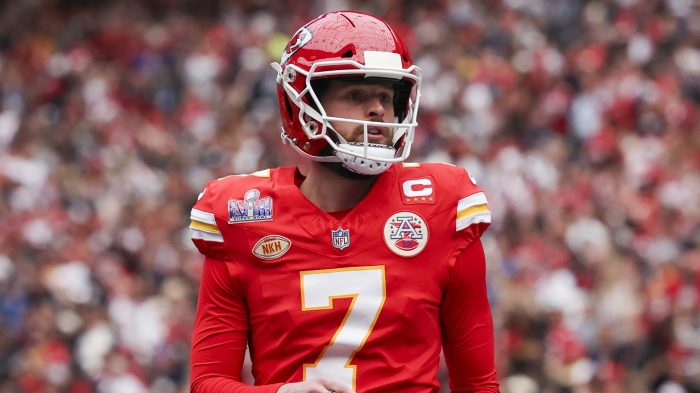Kansas City Chiefs kicker Harrison Butker delivered a commencement speech at Benedictine College on May 11 and it featured statements that are, at best, controversial and, more precisely, full of anti-trans bias, misogyny and anti-gay bias.
Butker’s comments have been met with an NFL statement that’s tepid in its rebuking. And while some commentators have ironically turned the “stick to sports” phrase usually aimed at Black athletes who speak up about injustices around on Butker, he most likely won’t suffer any tangible consequences for his comments. It’s a reminder that athletes, especially white athletes, can speak out as much as they want about any number of marginalized groups as long as they are punching down at those who society deems unworthy of defending.
First, it’s important to get into exactly what Butker said and how it reveals larger contradictions about who gets to enjoy freedom of speech in sports. Butker’s commencement speech targeted queer folks, trans folks and women with vitriolic nonsense. The kicker, who is Catholic, encouraged graduates to have Catholic pride but “not the deadly sin sort of pride that has an entire month dedicated to it” — a direct jab at Pride Month. He referred to diversity, equity and inclusion as “tyranny.” He said women’s rights to choose what to do with their bodies as well as “a growing support for degenerate cultural values and media, all stem from the pervasiveness of disorder.”
When speaking about women, Butker encouraged them to embrace serving men as homemakers as their true goal in life: “Some of you may go on to lead successful careers in the world, but I would venture to guess that the majority of you are most excited about your marriage and the children you will bring into this world.”
The entire speech was a barrage of harmful sentences and ventured far beyond the world of opinion and free speech into hate speech (his speech was denounced by the Benedictine sisters of Mount St. Scholastica, a sponsor of Benedictine College, on Friday). The rhetoric Butker employs here is the same type of rhetoric that incites violence against marginalized people across the world. And yet, the NFL released a lukewarm statement, distancing itself from the comments without actually making any strong stance: “Harrison Butker gave a speech in his personal capacity. His views are not those of the NFL as an organization. The NFL is steadfast in our commitment to inclusion, which only makes our league stronger.”

Ezra Shaw/Getty Images
When athletes like Butker use their platforms as a means to disparage marginalized groups, it’s always going to conjure up comparisons to one of the NFL’s most unforgettable sins: the excommunication of Colin Kaepernick.
The former 49ers quarterback famously had the audacity to kneel during the national anthem — a direct protest action to bring attention to the oppression of Black people in America. His public protest — which, again, was to bring attention to actual injustices — resulted in him being labeled a “distraction” and essentially made him persona non grata in the NFL, ending his career.
The NFL’s — and so much of America’s — treatment of Kaepernick will always be the elephant in the room whenever an NFL player is politically outspoken. We’ll always remember the lengths the league went to suppress Kaep and ban kneeling across the league. The comments about “inmates running the prison” and the panic over players inserting politics into sports will echo across the league forever. But that panic doesn’t seem to extend to players when they use abusive language against marginalized communities.
I know that some will say that Kaepernick was different because he did this on the field, but we live in a social media world of total access. Players don’t leave their politics at the stadium door before taking the field, just like they don’t stop being an athlete when they sit in front of a podcast mic or a commencement speech podium.
You can’t ignore the hypocrisy of people like Kaepernick being told to stick to sports while Butker is praised by those same ideologues for ranting about the LGBTQIA+ community as an abomination. Some people will read this and talk about Kaepernick being unpatriotic or un-American, but that falls flat on the same week that New York Jets quarterback and full-time podcaster Aaron Rodgers praised Russian president Vladimir Putin while criticizing President Joe Biden. That’s got to be actually unpatriotic, no?
And just as Rodgers has been able to insert politics and conspiracies on every platform he feels like, Butker will never have to worry about his politics impacting his football career. And any number of men, no matter their race, will continue to have careers unabated by their abuses of women because that’s how sports and the NFL operate.
The only players who feel the wrath of “cancel culture” are those who actually uplift marginalized communities. The rest who use language and violence to harm the most vulnerable among us won’t feel the wrath of so-called cancellation. That’s just not how this has ever worked.
Stick to sports. Shut up and dribble. Accusations of being unpatriotic. Being called a distraction. These are all words that gaslight. They’re coded language that poorly masks what’s actually being said: Your career is only in jeopardy if you speak up for those who actually need it.
Butker will have a career in the NFL as long as he can kick a football. He’ll also use his abhorrent comments as a jumpstart to his post-NFL career of giving speeches … about how his freedom of speech is being jeopardized.
